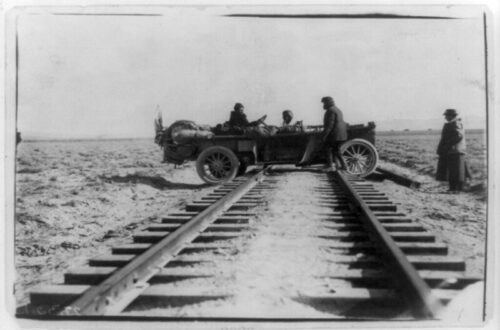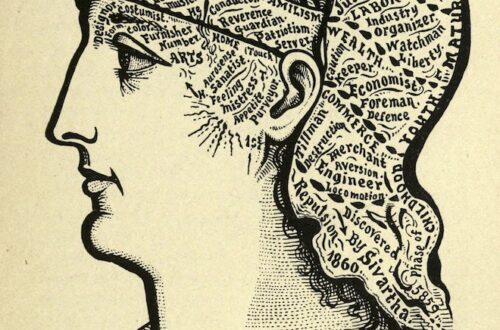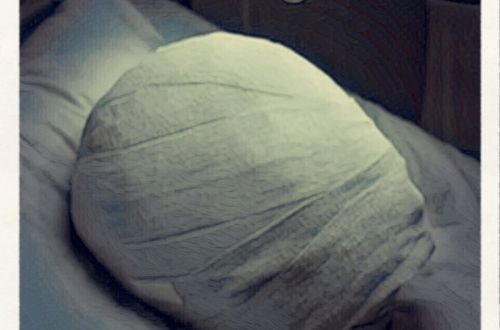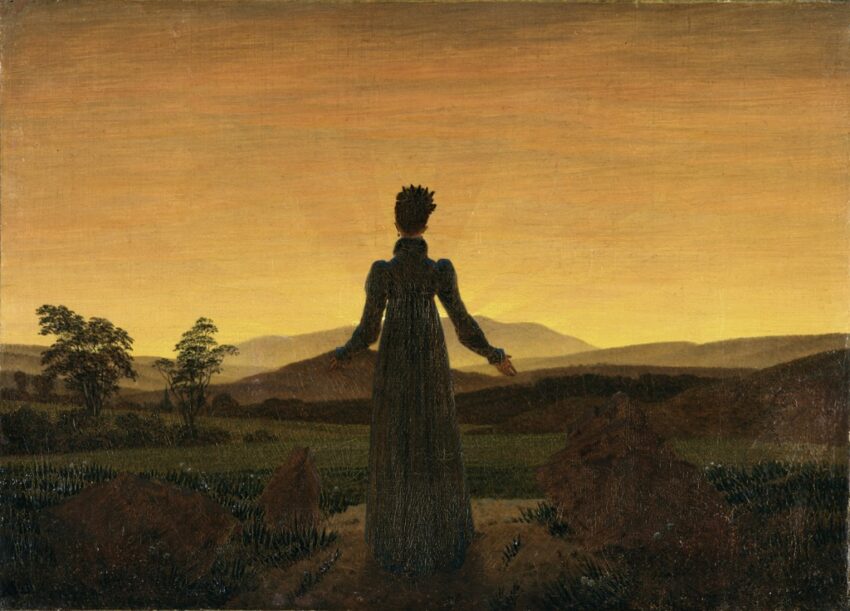
Sand Wall
By Laura Schadler
art by Caspar David Friedrich, 1817
I.
The woman’s recurring dream found her online dating, tapping ineffectually through a glitchy and pixelated app. In each subsequent dream, she feared it had been too long to respond to a message from the previous night.
The woman had married at a strange in-between time when almost no one online dated.
In a second dream, a small panther prowled along with that sultry shoulder swivel, as if on its way to kill something. She often woke distraught. She had lost track of the panther, or there was a whole claw of them, so identical that she could not find the original.
II.
The Pacific Ocean sloshed dark blue at the end of the road, of the journey, by scooter, the treacherous thirty miles or so west and up the hills and back down again.
Each afternoon she did this, it grew more and more windy. The earth was fitful, and she understood it, this desire to fling oneself about.
At one spot, if she timed it right, the sun was going down as the moon was coming up and the two celestial bodies rested on the same line of sight, and she’d stop, and her brain would scramble the life she had lived up until this point, and she would remember some odd detail: the time her friend’s mom was mean to her in college, the twenty dollars her grad school lover owed her for his moving truck, the moment she had fallen over into the grass under a tree full of lanterns, laughing hard while everyone around her stood sober.
In her backpack was a pink goblet, a sequined blue dress, a large piece of smooth driftwood. The bigger the concerns, the smaller your attention had to grow.
At the ocean, she put on the dress. She stuck the goblet into the foam, and pulled the salty water up to her mouth. She threw the piece of driftwood out as far as she could. She imagined the fish beneath the surface listening for sounds, feeling pain, knowing their way.
III.
The advice she had been given by a psychic when her husband first left was to switch all of her jewelry to the other hand. A way to combat the sadness. Strangely, she had already done this before the advice. Which made it feel less psychic. Then again, she had a way of downplaying her own psychic ability.
The woman was forty-one, an odd age that no one addressed in her social circles. It really was not as old as it had once seemed.
That’s true, Dakota agreed. Dakota was in her early thirties and dated a musician prone to hyperbole. Dakota was the woman’s landlady and a low-key Hollywood icon, generations of mothers and grandmothers before her.
The psychic had been at one of Dakota’s parties. The psychic had worn a vintage burlesque outfit and told the woman to spend her money freely and not to worry, which seemed irresponsible given the times.
The woman did worry. She stacked quarters in her jewelry box. She invested in cybersecurity in one share increments and watched as the small amount dipped lower each day. Everyone was nervous about money, a make believe thing, and rightly so.
IV.
The cops were out more. Even at the ocean. The journalists too. One of them, a young man with nails painted a powder blue that matched his suit, asked if she cared to comment.
“On?”
“The birds.”
She had never looked at birds before her husband named them. Look, he would say. A towhee. He had a way of doing that. Pointing out an obvious thing about the world that she had never paid attention to, but which was afterward impossible to live without. Just before he left, he had been making a list of regrets. A project that had spurred a move to Wyoming and a belief they were better off alone. It’s all going to get too big, he said, collecting non-perishable items and small, legal weapons. He did not elaborate. He had been reading a dense critical theory book about utopias. After he left, she opened the book one page at a time, read one sentence at a time. It was easy enough to understand that way. The self is a property.
“No, no comment,” she said, and the young journalist seemed disappointed in her, turned to talk to others on the beach. She wished she had something to tell him about the nature of utopias and dystopias, but she felt like most of it had been said before, in the book she hadn’t read.
V.
The woman looked at the map that showed where you lived and how it would be destroyed by a specific environmental calamity like wildfire or water scarcity. It felt better to know that everyone’s days were numbered.
One day, the woman woke up and the sky was entirely orange with atmospheric soot from morning to night. The odd thing was that even though it looked terrible, the soot was high in the atmosphere, held up by the clouds, and so the air quality was okay, better than the days that followed, when the sky was blue and no one could breathe.
Still, the soot set the mood. The middle of the night at ten in the morning and no one could think of anything to do but make jokes about the thing that was going to kill them all. Apocalypse filter and so forth.
VI.
When the woman walked unattended, she often tripped and fell on the uneven sidewalk. It embarrassed her, though no one was looking. She was too young to be tripping. She felt the premonition of her undoing.
The area reminded her of where her grandmother had lived on the east coast. Dakota’s farm house, in which she now rented a room, had once been modest, then briefly worth millions during a particularly strange time in California history, and was now worthless. Dakota kept the rent low and was never around except for the occasional party. Dakota’s money came from her ability to influence, and the woman could understand why. The landlady’s brief appearances were disorienting. She would show up in a dark suit, a sequined dress, an old car, a limo. She would check to make sure all was well, as well as could be. Sometimes, there would be a communal dinner, too much wine, green beans and vegan butter, something that resembled a peach.
The farmhouse was for women like this woman, alone yes, but also too old to try other avenues: the reality shows, the communes outside of California, graduate school.
Luckily, the woman’s window opened to the lower part of the roof that covered the side porch, and a former tenant had left a chair out there, a threadbare object embroidered in golds and browns. She crept out the window and sat in the chair. It made her living space feel bigger. She examined underneath the chair to see where it was made and saw, etched in the wood, a woman’s name. Elaine.
She worried that she would only care about the same things forever: exposés on murdered girls and their last moments, reality shows whose stars died (not on the show, but shortly enough after that it was odd, alarming, both), people who elaborately defrauded others with fake stories of cancer, violence, abuse. Other things too, She couldn’t tear herself away. The trivial personal tragedies and dramas of strangers. Their abilities to shapeshift, to trick even themselves.
She decided she would go by Elaine. Like the Abstract Expressionist artist, the one married to the more famous man. No one would get that reference and no one would notice the change. No one knew her well enough to say, Wait, wasn’t your name…? No one remembered anything anyway. Dakota might pause, but briefly, between champagne and swimming.
Dakota blew up the inflatable pool, the inflatable hot tub. They fell into the wasted water and felt hotter or colder, always arguing with the weather. When it had gotten so windy, Elaine could not be sure, but every day was now violent, and she braced herself as she went about even the simplest and shortest errands.
VII.
Elaine imagined emailing her college boyfriend to tell him she now had pubic hair. That would be a weird thing to do. Besides, she wasn’t being radical; it was just the trend. A better trend than what had come before. There was plenty to like about the nineties, the decade when she was a teenager, pre-internet, but plenty to not like as well. In the nineties, a boy she had a crush on had given her a list of books to read, all by men. She had not known to distrust him for his list, had read each book on it, had not understood why. Another boy, sexually experienced, had convinced her that what he wanted was also what she wanted, which had been hard to refute at the time. He had crafted her small beautiful gifts like a chess piece made of glass, which she had only recently discarded, the story feeling different now.
There were other things she would do differently too. In college, she had adopted a cat and she had not taken good care of it. She had tried. She had stolen the best food from the 24-hour grocery store. But she had not known how to care for things. It had all seemed funny. She drew hearts in lipstick on the headlights of her roommate’s car, bought bags of gummy worms, vodka in plastic bottles. The current state of the world was not entirely her fault, but she certainly had not helped, had barely understood the meaning of an absentee ballot.
Her current cat sat on her legs every night, drooped her chin around her ankle. It was not her cat. It had been feral, had made its way to her window sill. They were terribly bonded now. The cats affections could bring a strange surge of tears to Elaine’s eyes.
In a movie she watched one night, the internet was a novelty. It took a whole minute for the page to load so that the main character could tell that her husband had indeed faked his own death.
Elaine should be grateful, perhaps, that her own husband had not taken such extreme measures. He had simply gone in search of something perfect, and how could she blame him for that?
VIII.
Drought rules dictated one bath a week, per county ordinance. Gray water for all household tasks like the luxury of watering a plant or washing the dishes.
Elaine didn’t know how they would enforce it, but even sanctioned, her baths felt wrong. She turned the taps and let the tub fill halfway, mostly hot and then cold right at the end. Some people said baths were more water efficient. The young couple in the house across the street left lawn sprinklers unattended for hours every day and never got fined. The soft spray of even the low setting felt violent, intractable. Still damp, Elaine wrapped herself in a towel and snuck to their yard to turn off the sprinkler, her own bath ruined, the water tepid and unappealing upon her return.
On the fifth night of this, the man who lived in the house, the boyfriend, as she had come to think of him, saw her through the window. They paused. Looked right at each other. Before he could call out, she darted away.
There were other drought rules. Oat milk not dairy, succulent gardens not jasmine, gravel not grass, and buckets to collect the rainwater that almost never fell. Nothing in excess; personal responsibility prioritized over systemic, everyone held in a thrall of culpability and impact. A useful distraction that would never solve anything.
She took photos of the plants she encountered when she left the house:
- Harvest Brodiaea
- Bird’s-foot Trefoil
- Red-berried Elder
- Garden Cosmos
- American Cancer-root
Her cataloging of the end with no particular outcome in mind. A natural thing to do at the farm house, tucked back on its residential street of hydrangeas and bougainvillea. She photographed the things whose names she did not know. She never posted the photos. She could not find any of the plants a second time. Extinction happened fast.
There were conditions to her tenancy. Dakota drew up a contract that Elaine didn’t question. Thoughts are empty except to themselves. She didn’t entirely disagree, and nothing was explicit. The first months of her tenancy went by without incident. Elaine thought of her body as an expensive, unaffordable lot of land surrounded by hedge shrubs, magnolia, and jacaranda. She imagined herself full of golden channels of energy and felt sorry for anyone who found this difficult to understand.
She didn’t encounter fellow tenants, even though the house was relatively small, meant for a family from long ago. There was a shared kitchen that no one used, shared bathrooms at the end of the hall. There was a man who she sometimes passed when he was out walking his dog. She inexplicably felt she would have loved him in another life. This feeling was overwhelming. They only said hi, occasionally each other’s names.
“Hi Elaine,” he said, and she felt real.
IX.
Elaine knew the most about the couple who lived in the house with the sprinkler. She began to feel that her looking at them was the most urgent thing happening. After being spotted by the boyfriend, his non-reaction, she had grown more curious and brazen. Theirs was a more modest home than the farmhouse. Driven in on a truck; its occupants both beautiful, but their life overwhelmed by the domestic. The woman wore large white t-shirts. Sometimes in the dark of her own room, Elaine would see her, her back turned to the window, a screen glowing upon her turned face, curtains of dark hair. Later, the woman would be in bed, and the boyfriend would come stand over her and say something. On his social media, he explored tunnels beneath the city and charged others for tours.
One afternoon, Elaine showed up to his tunnel expedition. He wore a black t-shirt with an old punk band popular when she was a teenager, and she could not tell how young he was. She had expected his age to be more obvious, perhaps he was close to her age after all. This surprised her, made her uncomfortable. Something shifted between them even before the tour began. There were six other people there, clearly his friends. They made nerdy inside jokes, acted as if everything was a theatre performance and they were being watched. An analogue camera hung around his neck by a thick strap. He draped his tan fingertips over its edge. She imagined telling him all the things she knew about him: his girlfriend had long dark hair, he was proud of her for hustling at her job, which appeared to be buying and selling old clothes, he’d gone to school for photography and had earned modest commercial success, enough money to re-pipe his entire house to improve water efficiency, he had a little concave dip at the center of his chest (he often walked around without his shirt), but otherwise appeared strong, and a tattoo on his ribcage in a heavy metal font but she had never been able to make out the words.
He couldn’t possibly make efficient water pipe kind of money giving tunnel tours, no matter their price. She had paid forty-five dollars, giddy with her low rent, dreaming only occasionally about what Dakota really wanted in return, dreaming of her teeth falling out in her hands, which always meant something else was on her mind.
“You coming, miss?” the boyfriend asked. She looked at him and at the unremarkable tunnel he was going to guide her through. She nodded, and followed him in. Miss had sounded funny in his mouth, like a thing he didn’t normally say. Like, he was trying to figure something out. The tunnel was larger than she would have imagined and easy to navigate. His voice echoed back at her: the history of the city, the urban planning, the tunnel legends that had been woven over the years, the people who had disappeared inside, the ways the underground network might be used in the future, a future they could not fathom yet for its hardship and ingenuity.
Later, Elaine sat in the threadbare chair on the roof and watched the couple. She now watched them almost every evening. TV had grown monotonous with reality shows replacing self-purported fiction. She hadn’t thought much about the importance of fiction, and anyway, here she was making a documentary of her own, unable to sustain attention on anything but her two neighbors. The boyfriend’s tunnel tour had been cut short by a storm, unusual for this time of year and this geography. He had seemed relieved. He offered a refund rather than another date, and she had taken it, now free to observe them from the beginning of their evening. The girlfriend had placed tulips in a vase on the bedside table. Everything was white. A camera was set up on a tripod facing the bed. Their night went by as usual. Dinner on the couch, walking from room to room, the culmination them in bed on their laptops.
X.
Dakota phoned to say that she was studying the impact of fertility on the imagination. Was Elaine okay with that? Was it possible that Dakota knew she had not had her period since April of the previous year? All of these things were unrelated, of course, all the latest Supreme Court decisions, the drought, the pandemic, Elaine’s husband heading to Wyoming, and yet it had the cumulative effect of Elaine telling Dakota – Sure, study whatever you want…Like she could come up with any sort of hypothesis that had anything to do with anything.
Elaine started wearing gold outfits to tempt the neighbor’s eyes, but they never looked her way. A hot pink BMW drove by. A hummingbird with a red throat fluttered up to her with an unearthly sound. She could not have planned it brighter if she had tried, but the pair moved through their nightly choreography without turning her way. When Elaine first moved into the farmhouse, the couple had sex every night, curtains open. But they had not touched each other for months. Elaine took to crawling out on the roof ledge in her own states of undress, bare legs, only her bra, a slip that had belonged to her mother. They were not spying on her in return, at least not that she could tell. But the story she could give them would be quite the thriller: a woman left to her own devices, a woman on the run, a woman with another name, a woman who’d been left to die in the mountains and had made her way out.
Elaine signed up for the boyfriend’s next tunnel tour. This time it was only her and one other woman older than Elaine. The older woman had her mask on, as if she were ill in some way. Legend had it that menopausal women could talk to animals directly—the whales and the wolves and the bobcats. Elaine planned to be extra imaginative so she might skew Dakota’s findings about fertility. She assumed Dakota equated the imagination with the fertile. She would later learn this was not the case. She imagined murdering this man and leaving him in the tunnel. How was that for imagination? No one would know, and the older woman would understand and keep her secret, and they’d never see each other again, but they would have an understanding and be at peace with what had happened.
“How did you find me?” he asked, and she got caught up in looking at his face, thinking of the moments he took his shirt off and got into bed and looked at something on his computer. He did not seem to recognize her from the previous tunnel tour. She could not be sure she looked the same at all, and so maybe that made sense.
“I saw your flyer in town,” she said finally, and the old woman nodded along even though it wasn’t true. Perhaps the old woman was the assassin. Perhaps this was the kind of story where the immoral character must die at the end because there really is no redemption. Or when the woman has to die at the end because women just have to die.
“Well, I’m glad you’re here,” he said. She wondered what he said to his girlfriend when he stood at her side of the bed, and she nodded, and didn’t even look up at him because whatever was happening on her phone was more interesting than him. But he was interesting, Elaine believed, and as she followed him into the tunnels she decided she would not kill him after all.
XI.
They went further this time. To the end where the tunnel opened onto an old water utility plant. The boyfriend explained what the building was, what it had done, though now it sat empty. Elaine thought she was listening, but then couldn’t remember what he had said.
Elaine wondered if he knew about Elaine de Kooning. One painting, Cave #54, Sand Wall, windswept with the red outlines of animals mid-flight. She imagined standing in front of the painting with him, explaining it, explaining everything. He stood in front of her talking still, his back turned. She reached toward him. She was so close she could have touched his body. But she did not. Her fingertips hovered as near as they could without touch itself. The old woman moved behind them, finally making her way into the clearing. Elaine turned to her, surprised, and they caught eyes. The woman smiled and looked away.
The boyfriend stopped talking. He lifted his camera to take a photo of the abandoned building. Elaine could think of no questions to ask him, at least none that were relevant to this tunnel or this building or even this particular day or moment.
“Ready to go back?” he asked.
“In a minute,” she said and moved to stand beside him. They stood shoulder to shoulder looking at the building, the empty pipes and useless cisterns. They stood on cement and she felt the drought beneath its cracked surface. She picked up a piece of the cement, just a tiny shard like a shell or a gem, flicked it away from where they stood, watched it scatter briefly. She would ride to the ocean later. The sky was blue today and the air easy to breathe after the storm.
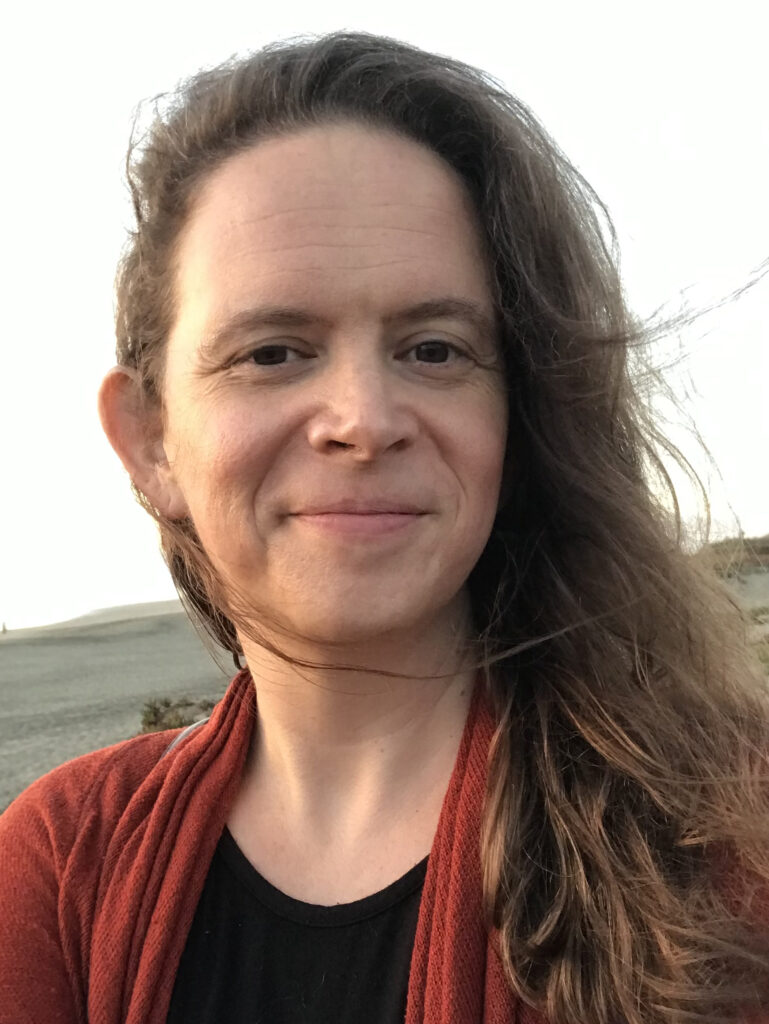
Laura Schadler grew up in the mountains of Virginia and now lives and writes in California. Her fiction has appeared in The Southern Review, Gettysburg Review, Denver Quarterly, SLICE, and Hypertext, among others. Laura was a MacDowell Fellow, and her short story collection was a finalist for the Flannery O'Connor Award for Short Fiction. She is currently at work on a collection of ghost stories.


